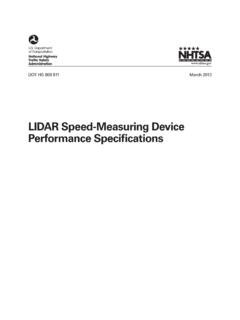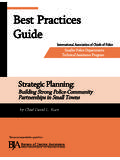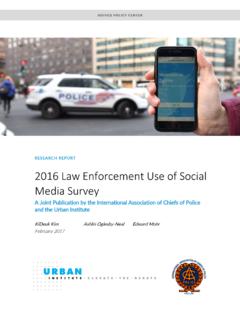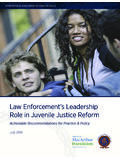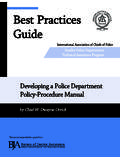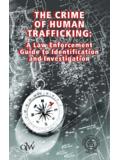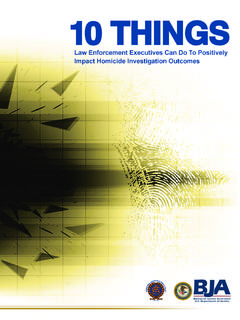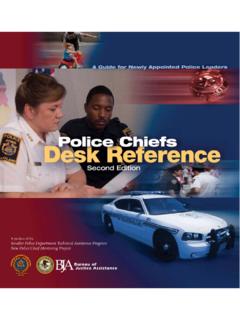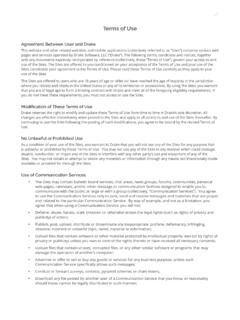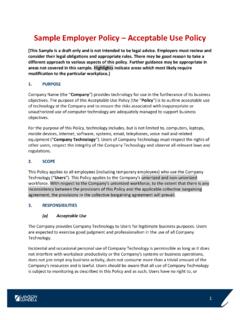Transcription of POLICE DISCRETION AND THE USE OF FORCE
1 1 SENIOR LEADERSHIP PROGRAM POLICE DISCRETION AND THE USE OF FORCE A STUDY OF THE USE OF FORCE AMONG LAW ENFORCEMENT OFFICERS IN BREVARD COUNTY Research Project for Director Dick Stephens Due Date: January 01, 2002 Prepared by Joanna Vitek 2 INTRODUCTION This research project is about POLICE DISCRETION and the use of FORCE ; specifically, the use of FORCE among law enforcement officers in Brevard County, Florida. DISCRETION in and of itself is not a bad thing, but the misuse of it has caused society to take a dim view of POLICE who abuse their powers.
2 Measures must be taken to establish clear and precise guidelines to govern the use of FORCE by POLICE . One does not have to look far to find evidence of the abuse and misuse of POLICE authority and power. Stories can be found in newspapers and on television regarding incidents of POLICE corruption and the misuse of DISCRETION daily. One case of POLICE abuse of FORCE is too many. This paper shall discuss POLICE DISCRETION , constitutional guarantees against unnecessary FORCE by POLICE , landmark Supreme Court decisions relating to the use of FORCE , state and federal civil liability, and POLICE policy and a matrix relating the use of FORCE to levels of resistance.
3 Ethical considerations in relationship to the use of FORCE by POLICE will also be considered. A study of the use of FORCE among law enforcement officers in Brevard County will also be discussed. Random samples of use of FORCE incidents involving Brevard County law enforcement officers in 2000 were gathered and analyzed. A study of this type has never been done. It is expected that the results will aid administrators in better understanding when, why, where, and how law enforcement officers in Brevard County use FORCE . 3 LITERATURE REVIEW POLICE DISCRETION AND THE USE OF FORCE DISCRETION can be defined as the power to make a choice.
4 It has been said that POLICE need DISCRETION to maintain order in society. DISCRETION is that characteristic which allows POLICE to balance the dynamic tension between civility and liberty in a democratic society ( ~ ). According to Kenneth Culp Davis, a POLICE officer has DISCRETION whenever the effective limits on his power leave him free to make a choice among possible courses of action or inaction (Davis 1969, p. 4). A POLICE officer s DISCRETION not to arrest represents the triumph of common sense over the excesses and unwisdom of legislators. (Davis 1975, pp 62-66). The function of the POLICE is multifaceted.
5 They are expected to enforce the law and maintain public order. The function of the POLICE also extends beyond their law enforcement and peacekeeping roles to include a variety of services. According to observational data gathered during a study, it was found that the POLICE on patrol, indeed, spend most of their time doing nothing at all or in routine activities such as learning the beat or socializing with local people (Haller, 1976). Nevertheless, POLICE officers find themselves conducting a variety of tasks tasks that no one else cares to perform. Regardless of how much time the POLICE do or do not spend on each task, the matter still remains that they are unique in their role as enforcers.
6 Bittner suggests that the POLICE are a mechanism for the distribution of non-negotiable coercive FORCE in accord with the dictates of an intuitive grasp of situational exigencies (Bittner, 1970). DISCRETION in criminal justice was discovered by a remarkable research project, the American Bar Foundation Survey of the Administration of Criminal Justice. (Walker, 1993, p. 6). The survey began in 1953 in response to concerns about organized crime. The research team discovered DISCRETION in the administration of criminal justice in 1956. It was found that many significant decisions were made from the time an 4 individual was introduced to the criminal justice system until the time he was released from it (Walker, 1993, ).
7 With the discovery of DISCRETION came the attempts to control it or abolish it. Further research and discussion indicate that DISCRETION is an inescapable reality, and the focus of reform shifts to efforts to regulate it (Walker, 1993, p. 16). Criticisms of how POLICE exercise their DISCRETION are not new or uncommon. POLICE officers have the authority to arrest. Authority is power. Oftentimes, POLICE exercise that power in complex and chaotic circumstances. POLICE officers use FORCE against people for a number of reasons, to detain, arrest, self-defense, in defense of others, in defense of property, to prevent escape or injury, to prevent destruction of evidence, and to quell riots.
8 Although there are many reasons why a POLICE may utilize FORCE , there is but one basic purpose to gain control of a person and to stop any threatening action by that person ( ). It is important to realize that DISCRETION is something that both an individual POLICE officer and a POLICE agency may exercise (Davis, 1969). DISCRETION is both a choice made by an individual officer and policy made by POLICE administrators who govern and influence the actions of officers. Additionally, it should be noted that decisions made by individual officers and agencies are discretionary insofar as they retain the power to make them.
9 An important issue about DISCRETION is the importance of action or inaction by the POLICE (Davis, 1969). When attempting to overcome actual or potential resistance, a POLICE officer can rely on one or more types of domination and control: authority, power, persuasion, and FORCE . The first three types of domination and control are achieved mentally. However, FORCE is physical and the will of the person coerced is irrelevant (Klockars, 1984 pp. 529-544). If the officer uses more FORCE than is objectively reasonable, the officer will violate the person s 4th Amendment right to be free from unreasonable seizures, the unreasonable use of excessive FORCE .
10 ( ). 5 There is much debate about how to control an officer s DISCRETION . There is no way to eliminate a patrolman s DISCRETION . He must work alone, or with one other patrolman at most, and he must handle chaotic situations. The solution is to make the patrolman a person who is capable of handling the DISCRETION and responsibility that is intrinsic to his job (Chief James Ahern, New Haven PD, 1972). Unfortunately, even competent and responsible officers have abused their DISCRETION as it relates to the use of FORCE . Therefore, it cannot be left up to the individual officer or his agency to exercise DISCRETION in his use of FORCE .

